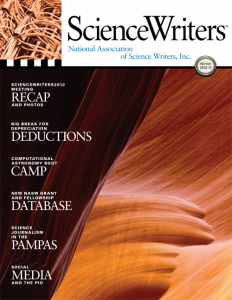By Julian Block
Tax-savvy freelance writers and other self-employed individuals know that they have two choices on how to write off their outlays for purchases of equipment and other kinds of personal property. One is depreciation; the other is so-called first-year expensing.
But countless tax-challenged writers mistakenly believe that depreciation is the only way to deduct equipment purchases. As a result, they pay far more in taxes each year than legally required.
Writers who go the “standard route” at Form 1040 time recover what they spend on equipment through depreciation deductions over varying periods. Section 167 of the Internal Revenue Code sets out the general rules for depreciation of various kinds of personal and real property. It specifies periods that range from as low as three years to as much as 39 years — with the majority closer to three than to 39.
Section 167 allows businesses to depreciate most of their equipment over five years or seven years. For example, it’s five years for computers, copiers, cameras, tape recorders, and the like and seven years for furniture, such as desks, chairs, file cabinets, and safes. Usually, the cap on the amount allowable as a deduction for the first year is only 20 percent of the cost of five-year property and about 14 percent of the cost of sevenyear property.
Section 179 authorizes first-year expensing for all kinds of businesses, whether full-time and long-established or part-time and just launched. They have the option to dispense with depreciation deductions over a period of at least three years and take advantage of first-year expensing.
Freelancers can “elect” — IRS idiom for decide — to use first-year expensing, should that prove to be more advantageous. Making the election entitles them to instantly write off the entire cost of the equipment in the first year it’s “placed in service” — meaning made ready and available for a specific use, whether or not actually used — rather than the year it was purchased or paid for.
To illustrate, equipment ready to operate by Dec. 31 generates a deduction for this year, though not paid for until after the year closes. Conversely, no deduction this year for equipment bought in December, but not installed until next year.
This tax break is subject to several restrictions. One that affects many writers is the taxable income limitation.
For example, science writer Hester Dimmesdale falls into a top federal and state tax bracket of 30 percent. She needs to replace lots of equipment. Her total purchases of $15,000 include computers and peripheral equipment such as printers and monitors, as well as desks, appliances, and carpets. Hester needn’t depreciate these items over five- or seven-year periods. Assuming it proves advantageous to use first-year expensing, the $15,000 expenditure will trim her taxes by $4,500.
The law allows Hester to take a first-year deduction of $15,000 only if that amount doesn’t exceed the net (receipts minus expenses) taxable income from her business, calculated before the Section 179 write-off on Schedule C. Put another way, she can’t use a first-year deduction to create a loss that offsets income from sources other than her business.
For purposes of this limit, taxable income has its own special meaning. Among other things, IRS regulations allow Hester to include wages she might receive from some job, as well as her spouse’s wages, provided she files jointly. Consequently, it’s possible for Hester to meet the taxable income limitation even if her writing venture is a start-up operation that shows little or no profit this year.
Suppose Hester’s equipment outlays of $15,000 are for a business with net taxable income of $10,000. She has no salaried income, but her husband does. Because Hester files jointly, she needs just $5,000 of his salary to qualify the business for a Section 179 deduction of $15,000.
Julian Block is an attorney and author based in Larchmont, N.Y. He has been cited as: “a leading tax professional” (New York Times); “an accomplished writer on taxes” (Wall Street Journal); and “an authority on tax planning” (Financial Planning Magazine). For information about his books, visit julianblocktaxexpert.com.

.png)

